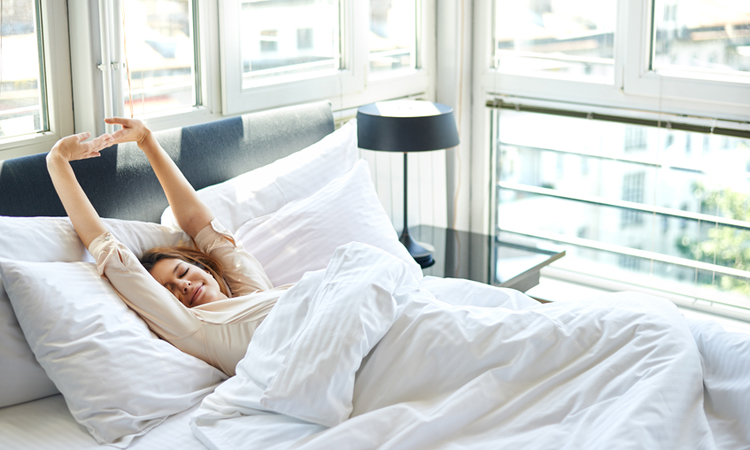If you are laying down for eight hours a night but only getting three hours of deep Rapid Eye Movement (REM) sleep, then you best believe that you’ll still be hitting the snooze button and dragging your groggy body out of bed the next morning. Healthy sleep affects physical and mental recovery, memory, learning, growth and active longevity [1]. In this article, I lay out the five steps to getting more restful sleep, starting tonight.
#1: Resolve your issues
Whether it’s a disagreement with your spouse, conflict with a colleague or you are being hard on yourself again, resolve it in whatever way possible. If you can’t resolve the issue face-to-face, go a little deeper and see if you can’t identify what about the conflict bothers you. Do you feel angry, sad, betrayed, guilty or manipulated? Is this a common theme in many of your relationships?
If so, this may be a chance for you to do some personal reflection.
#2: Light and noise pollution can make it difficult to fall and stay asleep
Try turning off all lights, covering your clocks and using blackout blinds. If you sleep with a partner who snores, is a restless shifter or goes to bed after you, make sure they are mindful of not disturbing you. Same goes for you if you are the night owl.
You may need to wear earplugs and an eye mask, change to a non-spring mattress or convince your partner to change their sleep patterns to go to bed earlier. Wearing eye masks and earplugs can significantly improve sleep quality [2].
#3: Unplug all electronics in your bedroom before you go to bed—or keep them out of the room
This includes mobile cell phones, cordless phones along with their base stations, wifi devices, microwave ovens, television and radio transmitters [4, 5]. Some people report a high sensitivity to radiofrequency (RF) electromagnetic fields (EMF). Despite inconclusive findings for negative effects of chronic low frequency EMF exposure, I’d recommend minimizing your intake and avoiding long-term close contact of your devices to your body, such as sleeping with your cell phone under your pillow [4].
If you read before bed, use a physical book. The light from many electronic devices triggers your sympathetic nervous system and release of cortisol and inhibits melatonin. This will make you more energized and alert, which interrupts your sleeping pattern. There are many new eReaders that help to minimize light stimulation before bedtime, so shop carefully.
Also avoid reading in bed. Make bed a place for physical intimacy and sleep, only. Start creating a psychological association of bed to sleep.
And don’t forget to set your phone on airplane mode to avoid incoming calls, messages and EMFs. Don’t worry, your alarms will still work; I do this every night.
#4: Practice a relaxing exercise before going to bed:
- Have a lukewarm bath
- Use lavender candles or relaxing essential oils on your pillow
- Listen to calming music or meditate
- Have some chamomile tea
Get in the habit of following the same routine every night. Something I recently tried was a sensory-deprivation pod, in which you lay in water of neutral temperature with a very high salt or magnesium concentration allowing you to float [6]. They are also called isolation tanks or floating baths and create a virtually stimulation-free environment. The room goes completely dark, and you are free of any sensory distractions, such as noise, sight, touch, smell or taste. Participants show a significant decrease in blood pressure and more relaxation post-treatment [7].
#5: Avoid stimulants after 4pm
No caffeine, sugar, or other stimulants:
- Caffeine: coffee, green or black tea, yerba, soda, red bull, etc.
- Herbal stimulants: Ginkgo, Ginseng, Glycerrhiza
- Electronic usage: TV, computer, tablets, video games—especially violent or emotionally stimulating content. Use of multiple electronic devices is associated with less sleep at night and increased sleepiness in the day.
So, how much sleep do I need?
As you can see, there are many factors that can affect the quality of sleep. Sleep deprivation affects your entire body, from your weight and thyroid function to your energy levels and cognitive performance.
For adults, seven to eight hours per night is recommended for optimal sleep, although there are variations between men, women and age groups [3, 1]. Women between 50 to 70 years old appear to require the most sleep [1]. When we start practicing the above healthy Sleep Hygiene Habits, the quality of sleep improves and the number of hours you require to feel at your optimal self may actually decrease!
This article originally appeared on DrAlisonChen.com and is republished here with permission.
References
- Lee H, Kim S, Kim D. Effects of exercise with or without light exposure on sleep quality and hormone reponses. J Exerc. Nutrition Biochem. 2014 Sep;18(3):293-9. https://www.ncbi.nlm.nih.gov/pmc/articles/PMC4241899/
- Yazdannik AR, Zareie A, Hasanpour M, Kashefi P. The effect of earplugs and eye mask on patients’ perceived sleep quality in intensive care unit. Iran J Nurs Midwifery Res. 2014 Nov;19(6):673-8. https://www.ncbi.nlm.nih.gov/pmc/articles/PMC4280735/
- Adámková V, Hubácek JA, Lánská V, Vrablík M, Králová Lesná I, Suchánek P, Zimmelová P, Veleminský M. Association between duration of the sleep and body weight. Physiol Res. 2009;58 Suppl 1:S27-31. http://www.biomed.cas.cz/physiolres/pdf/58%20Suppl%201/58_S27.pdf
- Bogers RP, Bolte JF, Houtveen JH, Lebret E, van Strien RT, Schipper CM, Alkadhimi M, Baliatsas C, van Kamp I. Design of an ecological momentary assessment study of exposure to radiofrequency electromagnetic fields and non-specific physical symptoms. BMJ Open. 2013 Aug 29;3(8):e002933. http://bmjopen.bmj.com/content/3/8/e002933.long
- Gajšek P, Ravazzani P, Wiart J, Grellier J, Samaras T, Thuróczy G. Electromagnetic field exposure assessment in Europe radiofrequency fields (10 MHz-6 GHz). J Expo Sci Environ Epidemiol. 2015 Jan;25(1):37-44. https://www.ncbi.nlm.nih.gov/pubmed/23942394
- Lann MA, Martin A. An unusual death involving a sensory deprivation tank. J Forensic Sci. 2010 Nov;55(6):1638-40. https://www.ncbi.nlm.nih.gov/pubmed/20533982
- Jacobs GD, Heilbronner RL, Stanley JM. The effects of short term flotation REST on relaxation: a controlled study. Health Psychol. 1984;3(2):99-112. https://www.ncbi.nlm.nih.gov/pubmed/6399246



